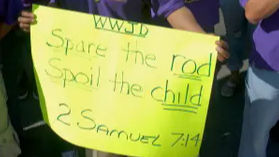A Missouri school district
has brought back spanking as an effective method to discipline students if
parents allow it. The Casville School District in southwestern Missouri, which
covers a 100-kilometre radius and is school to 1,900 students, has reinstated
the corporal punishment method despite warnings from public health experts that
the practice is detrimental to students.
The school district arrived
at the decision after an anonymous survey of parents, students and school
employees who were concerned about student behaviour, according to Superintendent
Meryl Johnson who spoke to The Springfield News-Leader. “We’ve had people actually
thank us for it,” Johnson said, adding, “Surprisingly, those on social media
would probably be appalled to hear us say such things, but the majority of
people I’ve run into have been supportive.”
Also Read | After Uvalde: Outcry focuses on school failures, solutions
As per the new policy, corporal
punishment will only be used on students when other forms of punishment have
failed and only with the superintendent’s permission. Spanking or corporal
punishment was outlawed in the school district in 2001.
The United States Supreme
Court had found corporal punishment constitutional in 1977. Since then, states
have been allowed to frame policies according to their needs. Nineteen out of
the 50 states in the US allow corporal punishment, according to Morgan Craven,
the national director of policy, advocacy and community engagement with the
Intercultural Development Research Association.
Also Read | Is college even worth it? Biden’s student debt relief raises crucial question
Craven, who believes
corporal punishment is “wildly inappropriate, ineffective practice” told Associated
Press said 70,000 children in the US were hit at least once in their schools,
according to 2017-18 data. Students who are hit at school do not fare well
because they suffer physical and psychological trauma, Craven said.
“If you have a situation
where a kid goes to school and they could be slapped for, you know, some minor
offense, it certainly creates a really hostile, unpredictable and violent
environment,” said Craven, adding, “And that’s not what we want for kids in
schools.”
Also Read | Why Florida’s ‘Don’t Say Gay’ law has schoolteachers in a fix
But 54-year-old Tess
Walters, who is guardian to an eight-year-old granddaughter says she had no
qualms in signing on for corporal punishment for the child. She said the
possibility of spanking is a deterrent for her granddaughter who has
hyperactivity disorder.
“I’ve read some people’s
responses on Facebook recently, and they’re just going over the top like, ‘Oh,
this is abuse, and, oh, you’re just going to threaten them with, you know,
violence.’ And I’m like, ‘What? The child is getting spanked once; its not
beatings.’ People are just going crazy. They’re just being ridiculous,” said
Walters.
Meanwhile, Khristina
Harkey, parent to a six-year-old child who is autistic, said she and her husband
and opted-out of the policy, but Harkey believes there are different kinds of
kids. “Some people need a good butt-whipping, I was one of them,” said Harkey relating
to Associated Press her own behaviour as a school student.
However, Mitch Prinstein,
chief science officer at the American Psychological Association said there’s
decades of research to show that corporal punishment not only fails to deter
inappropriate behaviour but is likely to increase aggression, rage, hostility,
depression and self-esteem related troubles.







